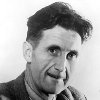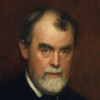“ When we love a thing similar to ourselves we endeavour, as far as we can, to bring about that it should love us in return. ”
Baruch Spinoza, Ethics (1677). copy citation
| Author | Baruch Spinoza |
|---|---|
| Source | Ethics |
| Topic | love |
| Date | 1677 |
| Language | English |
| Reference | |
| Note | Translated by R. H. M. Elwes |
| Weblink | http://www.gutenberg.org/files/3800/3800-h/3800-h.htm |
Context
“inasmuch as the images of things are, as we have said, modifications of the human body, or modes wherein the human body is affected and disposed by external causes to act in this or that manner.
PROP. XXXIII. When we love a thing similar to ourselves we endeavour, as far as we can, to bring about that it should love us in return.
Proof.—That which we love we endeavour, as far as we can, to conceive in preference to anything else (III. xii.) . If the thing be similar to ourselves, we shall endeavour to affect it pleasurably in preference to anything else”
source



